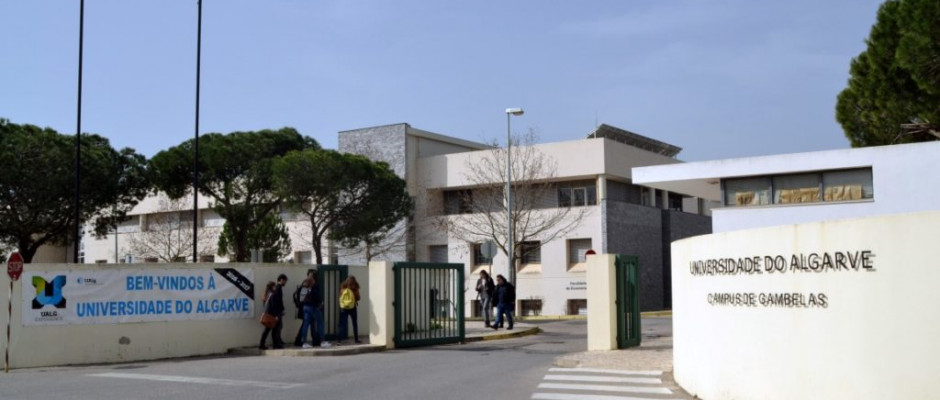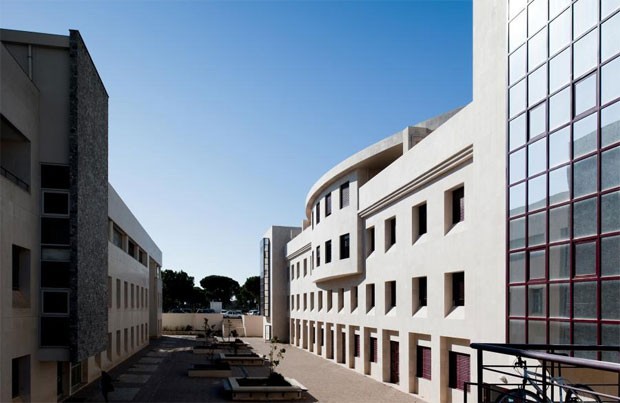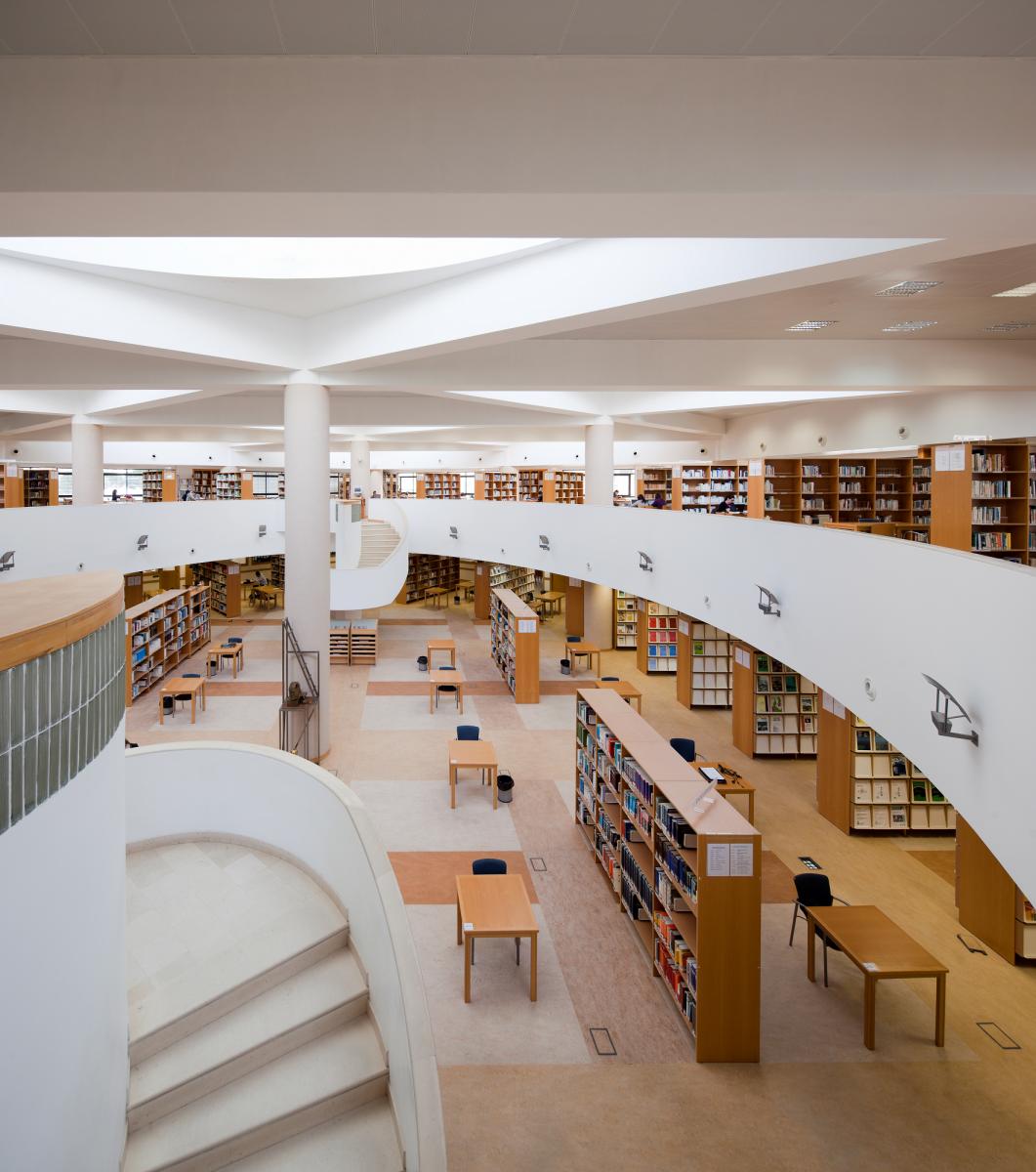General Information
The University of Algarve is a leader in teaching and research in marine sciences, fisheries, aquaculture, biodiversity and conservation in Portugal. The University, with approximately 9500 students, offers a variety of BSc, MSc and PhD programmes in these areas.
The largest research centre is the Centre of Marine Sciences (CCMAR) an independent multidisciplinary, non-profit research organisation within the University of Algarve system. CCMAR is one of the foremost marine science research centres in Portugal, classified as "Excellent" in the 2014 research assessment of the Foundation for Science and Technology. The ongoing research in CCMAR focuses on various aspects of marine life and ecosystems, covering areas such as Molecular Biology and Biotechnology of marine organisms, Genetics of Populations, Endocrinology, Biophysics, Aquaculture, Biodiversity and Ecology of marine populations and communities, Ecohydrology, Organic Chemistry, Environmental Technologies and the Study and Management of Fisheries Resources. CCMAR hosts 110 scientists, 40 PhD students and 100 young scientists and technicians. CCMAR has very good infrastructure and equipment to carry out research and advanced training.
Core facilities, available for internal and external services, provide:
i) a technology platform with molecular biology, analytical chemistry, ecology, imaging, scientific diving capacities,
ii) Ramalhete marine station with tanks to keep to keep live organisms and large outdoor mesocosms,
iii) administrative and project management services,
iv) a computing and bioinformatics platform and
v) a communication, outreach and events (workshops and conferences) office.
CCMAR is part of national nodes for European Strategy Forum on Research Infrastructures (ESFRI): EMBRC.PT (EMBRC), is a member of Biodata.PT, the national node of ELIXIR and a member of the national node of EMSO.
Housing
Although there are some university residences available (rooms are double; kitchen, bathroom and other common areas are shared; 130,95 euros/month), most students rent apartments or houses in town or on the beach (Praia de Faro). Information on rentals is available at the International Relations and Mobility Office (GRIM – Gabinete de Relações Internacionais e Mobilidade), at the Student Association or can be found posted in supermarkets and shops located near the university and also in the faculty (FCT, Building 7).
For temporary accommodation, there are various hostels, like the youth hostel (faro@movijovem.pt), for 25-50 euros per night, and well-located hotels, such as Aeromar, Alnacir, Best Western Dom Bernardo. To stay in the university residences from September 1 on, students should contact the Mobility office: international@ualg.pt.
Useful Links:
Information on studying in Portugal
Living Costs:
Apartments and houses for rent are readily available from September to July. Rent plus utilities (electricity, gas and water) for single room in an apartment shared with other students ranges from 240-420 € per month. As for deposits, it is common practice to pay 2 months in advance.
Students can eat at University campus canteens for 2.30-2.70€ per meal (soup, choice of main course, dessert or fruit and drink). There are numerous restaurants in Faro, offering a wide choice of cuisine, including vegetarian. Prices for a full meal at affordable restaurants range from 5 to 10 €. A monthly public bus pass costs 28.40 €, while a single bus ticket (Faro-Gambelas Campus) costs ca. 2,2 €. Some students rent rooms or apartments within walking distance from the Gambelas Campus, in Gambelas or Montegro. Many students bike to the Gambelas campus from the Praia de Faro and other areas.
Services
A welcome/orientation week is organised by GRIM for the foreign students in September. The UAlg main library is located in the Gambelas campus where IMBRSea teaching will take place. The library has study rooms that can be used by small groups of students. The student union organises social, sport and recreational activities for students. For example, there is a diving club (NAS) which IMBRSea students can join. A highlight of the student year is the Semana Academica, a week of activities, including concerts, organised by the student union.
The university social services are responsible for the student residence and canteens. Students have access to university medical staff.
Upon registration, students are given a student number and password allowing access to the electronic tutorial (Moodle) where class material is available. They can also access electronic databases (e.g. Web of Science, Science Direct, etc.).
Language Opportunities:
A Portuguese as a Foreign Language (PFL) Summer Colurse is offered in July (60 hours; 5 ECTS), with different proficiency levels:
- Basic User A1 (Breakthrough or beginner): students with no knowledge of Portuguese;
- Basic User A2 (Way stage or elementary): students able to express basic phrases in Portuguese;
- Independent User B1 (Threshold or intermediate): students with intermediate knowledge of Portuguese and able to communicate and interact in simple and everyday matters;
- Independent User B2 (Vantage or upper intermediate): students able to communicate with a degree of fluency, complexity and detail with Portuguese native speakers;
- Proficient User: students in command of the Portuguese language and proving fluency in communication and work related contexts. Students who aim to deepen their respective knowledge concerning Portuguese discursive structures.
During the first semester, students can take a Portuguese as a Foreign Language course for 6 ECTS along the 15 weeks of the semester (September to December). As with the PFL Summer Course, students are first tested before placement in the appropriate level. The cost of the PFL course is 100 euros and includes the books.
Visa information
As Portugal is part of the Schengen Area, citizens of the EU the European Economic Area (EEA – Andorra, Iceland, Liechtenstein and Norway) as well as Switzerland need only an identity card in order to enter Portugal.
For students from outside the EU, the necessary documents for student visa applications for entry in Portugal are:
- Passport or other travelling document (Expiration date not less than three months later than visa’s)
- Three passport size photos
- Criminal register
- Health insurance certificate
- Lodging certificate in Portugal
- Proof of funds upon arrival in Portugal
- Academic registration document
- Vaccines bulletin
- Academic qualifications document (certified by the local Portuguese Embassy/Consulate)
Additional documents may be required, so this information should be confirmed when requesting a Visa at the nearest Portuguese consulate.
It is important to apply for a visa as early as possible. Students should not wait until August to apply for a visa.
Exams
The grading system is from 0 to 20 points, with 10 as the minimum passing grade. Evaluation can be in the following forms: written, oral, practical, laboratory or any combination of these.
Evaluation can be during the 15 weeks of classes and/or during the exam periods (January and June). There are two exams in each exam period, two weeks apart: Normal exam and Resit exam.
Tests / exams must stipulate the duration and the marks for each question and part of the test/exam. Students have the right to consult their tests/exams after these have been corrected.
If an exam/test grade is contested by a student, a jury will be formed to review the marking.
The regulation states that students can miss up to 25% of the contact time of a course without justification. If a student misses more than 25% of the classes (contact time: lectures, labs, fieldwork, etc.), then this has to be justified. To justify missing more than 25% the regulation states:
- Absences are likely to be considered justified by providing proof up to 5 working days after the end of the impediment .
- Justified absences are not taken into account for verifying compliance with the attendance regulation and give the right to require new dates for tests and exams, to be determined with the respective teacher.
- If the case of a missed final examination, scheduling of the new date must be requested to the Pedagogic Council, accompanied by proof (e.g. statement from Hospital or Doctor), no later than 5 working days after the date of the exam, unless the student is unable to do so.
- The jurisdiction of the Pedagogical Council for marking the new date of the final examination may be delegated to its Chairman.
- If the proofs for the justified absence are not delivered within the time limits provided for in this article, the faults are considered unjustified.




